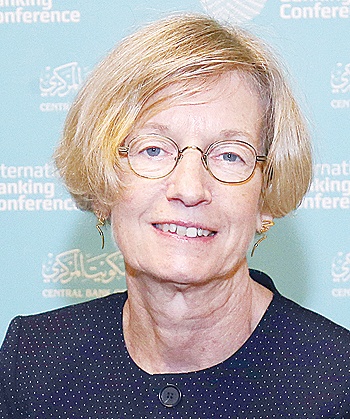Trade tension could impact financial markets in Gulf region, says expert

KUWAIT: Kuwait Times spoke with Dr Catherine Mann, Global Chief Economist for Citibank, during the Central Bank of Kuwait's International Banking Conference: 'Shaping the Future', in Kuwait City yesterday.
KT: What is your expectation for the global economy in the next year? Do you think we will see a global recession?
Dr Catherine Mann: The question about the global recession is misplaced. The likelihood of having a global recession is quite low. In fact, in our predictions, we see some improvement in emerging markets, even as the advanced economies are slowing. So we have diversions in prospects for advanced economies and emerging markets. It's rare for emerging markets to be the locomotive for the global economy. So there is a fragility and we are concerned about that, but right now, we don't have a global recession on the horizon.
KT: How do you see this impacting the Gulf region in case of a possible recession?
Dr Mann: We worry about the consequences of an escalation of trade tensions between the US and China, which will have a global impact through global value chains. On top of this fragility, there is definitely a concern that advanced economies are slowing, which has an implication on the demand for major energy products from the Gulf region. If this trade tension escalates, it will impact financial markets and cause turbulence in financial markets. That is going to create additional downdrafts for the global economy.
KT: What are the main factors that will trigger or lead to a recession?
Dr Mann: The centerpiece for our concerns is trade - most people think of trade in goods and services. But our analyses find that financial turbulence might be associated with trade tensions getting worse. This financial turbulence is the more important factor. In many countries, the central banks are easing policy to buoy up financial markets so that they don't become a conduit for worsening trade tensions.
This is also a problem, because if you buoy up financial markets, and trade tensions continue to get worse, you have the possibility of asset bubbles. If the real economy is getting worse and assets are being underpinned by central bank easing, that's not a recipe for a stable economy going forward. So there are number of different concerns that we have on the real side, with trade on the financial side and turbulence coming from trade.
KT: How do you see fintech progressing as a segment of the global financial industry? Do you see it overtaking traditional banking/investment houses or working more in partnership/collaborations? Or perhaps being absorbed or competed with by traditional financial establishments?
Dr Mann: I think that fintech is creating competition and new innovations in delivering services for consumer-oriented retail banking. They are very important in terms of payment systems, but there are so many aspects, where large multinational banks that have many different product areas they can offer a client. These are the economies of scope - in other words, these products and services work together to serve the client.
So far, fintech has not been able to produce competitive products where there is economy of scope. Fintech is relatively more adaptable, competitive and innovative in the consumer retail banking space. There are some differences in the uptake of innovation and fintech is going to be a competitive threat.

